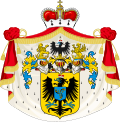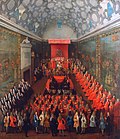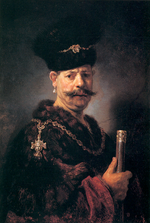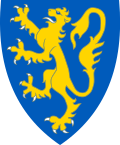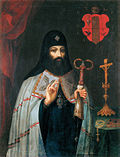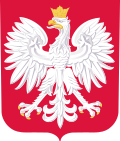The Ruthenian nobility (Ukrainian: Руська шляхта, romanized: Ruska shlyakhta; Belarusian: Руская шляхта, romanized: Ruskaja šlachta; Polish: szlachta ruska)...
28 KB (3,091 words) - 23:22, 16 November 2024
the predations of the Reformation. While the Ruthenian nobility had equal rights with the Polish nobility, by the fifteenth century their ranks had been...
20 KB (2,077 words) - 10:18, 29 December 2024
century Ruthenian Byzantine Catholic Church, one of the 23 particular (sui iuris) Eastern Catholic Churches Ruthenian nobility, East Slavic nobility of the...
2 KB (272 words) - 13:03, 28 September 2024
Ruthenian (ру́скаꙗ мо́ва or ру́скїй ѧзы́къ;[failed verification] see also other names) is an exonymic linguonym for a closely related group of East Slavic...
30 KB (2,883 words) - 12:48, 19 January 2025
Ruthenian and Ruthene are exonyms of Latin origin, formerly used in Eastern and Central Europe as common ethnonyms for East Slavs, particularly during...
46 KB (4,759 words) - 23:30, 13 January 2025
Szlachta (redirect from Polish nobility)
were not in fact noble by birth. Szlachta also denotes the Ruthenian and Lithuanian nobility from before the old Commonwealth. In the past, a misconception...
173 KB (19,219 words) - 23:57, 15 February 2025
Radziwiłł family (category Ruthenian nobility)
titles in 1549. So high a title was rare among the szlachta (the Polish nobility): just five Polish families, including the Radziwiłłs, received the title...
60 KB (7,011 words) - 10:37, 13 February 2025
Lithuanian nobility Maltese nobility Montenegrin nobility Norwegian nobility Polish nobility Magnates Portuguese nobility Russian nobility Boyars Ruthenian nobility...
88 KB (10,363 words) - 19:45, 26 January 2025
Rusyns (redirect from Carpatho-Ruthenian Rusyns)
or Карпатьскы Русины, romanized: Karpatorusynŷ or Karpaťskŷ Rusynŷ), Ruthenians, or Rusnaks (Rusyn: Руснакы or Руснаци, romanized: Rusnakŷ or Rusnacy)...
117 KB (12,030 words) - 22:11, 3 February 2025
Krzysztof Kosiński (category Ruthenian nobility of the Polish–Lithuanian Commonwealth)
self-proclaimed hetman. He led two consecutive rebellions against the local Ruthenian nobility, known as the Kosiński uprising. The Kosiński uprising (1591–1593)...
3 KB (199 words) - 16:25, 25 October 2024
of the local Lithuanian nobility, Polish was introduced as the official language instead of the previously existing Ruthenian language. In the 18th century...
57 KB (6,778 words) - 17:06, 16 February 2025
Tadeusz Kościuszko (category Ruthenian nobility of the Polish–Lithuanian Commonwealth)
Ratomskis, were also Ruthenian. His family had become Polonized as early as the 16th century. Like most Polish–Lithuanian nobility of the time, the Kościuszkos...
96 KB (10,297 words) - 12:45, 10 February 2025
August Aleksander Czartoryski (category Ruthenian nobility of the Polish–Lithuanian Commonwealth)
of the Polish nobility (Polish: szlachcic), magnate. August became major-general of the Polish Army in 1729, voivode of the Ruthenian Voivodeship in...
4 KB (183 words) - 10:24, 27 November 2024
language and Catholicism became dominant for the Ruthenian nobility, most of whom were initially Ruthenian-speaking and Eastern Orthodox by religion. However...
26 KB (2,839 words) - 03:00, 7 February 2025
List of szlachta (redirect from List of Polish nobility)
increasingly Polonized nobilities of territories controlled by the Polish–Lithuanian Commonwealth, including Ducal Prussia and the Ruthenian lands. The Polish–Lithuanian...
46 KB (4,118 words) - 06:27, 14 February 2025
and all Ruthenia was an ecclesiastical territory or archeparchy of the Ruthenian Uniate Church, a particular Eastern Catholic church. It was erected in...
11 KB (1,139 words) - 07:47, 26 October 2024
Michael Glinski (category Ruthenian nobility)
boast of personal connections and relationships with many members of the nobility, including Emperor Maximilian I. In late 1498, Glinsky returned to Lithuania...
10 KB (1,222 words) - 15:33, 15 January 2025
Stanisław Odrowąż (category Ruthenian nobility)
since 1533, starost of Lwów since 1534, voivode of Podole Voivodship since 1535, voivode of Ruthenian Voivodship since 1542 and starost of Sambor. v t e...
2 KB (65 words) - 21:54, 2 January 2023
and Ruthenia Polish–Lithuanian–Ruthenian Commonwealth Kingdom of Ruthenia Ruthenian (disambiguation) Ruthenian nobility Polish National Government (January...
30 KB (3,150 words) - 04:10, 10 January 2025
Jan Tarnowski (category Ruthenian nobility)
Sioło. In 1522, he became castellan of Wojnicz; in 1527, voivode of the Ruthenian Voivodeship; in 1535, voivode of the Kraków Voivodeship. In 1536, he became...
12 KB (1,219 words) - 03:36, 30 September 2024
Józef Boruwłaski (category Ruthenian nobility of the Polish–Lithuanian Commonwealth)
Józef Boruwłaski (November 1739–September 5, 1837) was a Polish-born dwarf who was employed by the court and who was also a musician who toured in European...
10 KB (1,403 words) - 18:18, 9 December 2024
King of Ruthenia (redirect from Ruthenian king of Galicia-Volhynia)
Ruthenia, King of Rus', King of Galicia and Lodomeria, Lord and Heir of Ruthenian Lands (Latin: Rex Rusiae, Rex Ruthenorum, Rex Galiciae et Lodomeriae,...
9 KB (978 words) - 07:34, 18 January 2025
Petro Mohyla (category Ruthenian nobility)
father was murdered in 1607, Mohyla and his mother sought refuge in the Ruthenian Voivodeship, part of Lesser Poland. For a time, they lived in Kamianets-Podilskyi...
27 KB (2,652 words) - 01:40, 18 January 2025
Marianne Faithfull (category Austrian nobility)
(1875–1953), an Austro-Hungarian nobleman of old Polonized Catholic Ruthenian nobility. Eva was born in Budapest and moved to Vienna in 1918; she chose to...
86 KB (8,043 words) - 07:55, 16 February 2025
Polonization (category Ruthenians in the Polish–Lithuanian Commonwealth)
introduced there. Among the settlers was also a petty nobility. Ruthenian, just like Lithuanian, nobility was attracted by the Polish culture, which at that...
69 KB (8,349 words) - 12:58, 13 February 2025
Stanisław Jan Jabłonowski (category Ruthenian nobility of the Polish–Lithuanian Commonwealth)
since 1660, the Grand Camp Leader of the Crown since 1661, voivode of the Ruthenian Voivodship since 1664, Field Crown Hetman since 1676, Great Crown Hetman...
5 KB (316 words) - 15:36, 9 February 2025
Ivan Sirko (category Ruthenian nobility)
Sirko's father is identified as a Ukrainian of either Ruthenian or Cossack Orthodox nobility. Sirko's mother is identified as a native of Podolia, but...
50 KB (5,085 words) - 21:44, 14 February 2025
Stanisław Żółkiewski (category Ruthenian nobility of the Polish–Lithuanian Commonwealth)
Stanisław Żółkiewski (Polish pronunciation: [staˈɲiswav ʐuwˈkʲɛfskʲi]; 1547 – 7 October 1620) was a Polish nobleman of the Lubicz coat of arms, a magnate...
23 KB (2,319 words) - 23:18, 2 December 2024
Polish heraldry (category Ruthenian nobility of the Polish–Lithuanian Commonwealth)
Polish heraldry is an integral part of the history of the Polish szlachta (nobility). Unlike Western Europe, in Poland, the Polish nobles szlachta did not...
32 KB (3,777 words) - 20:50, 26 October 2024
Krzysztof Zbaraski (category Ruthenian nobility of the Polish–Lithuanian Commonwealth)
Prince Krzysztof Zbaraski (Polish: Krzysztof Zbaraski, Ukrainian: Христофор Збаразький, 1580 – 6 March 1627) was a Polish–Lithuanian member of the gentry...
3 KB (219 words) - 03:20, 27 October 2024




